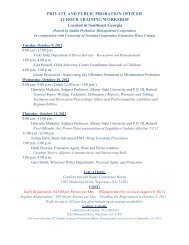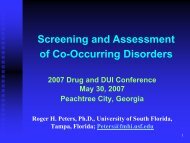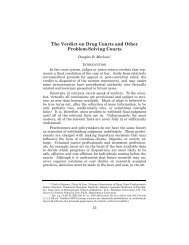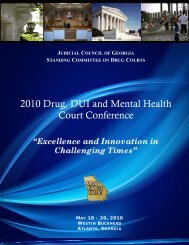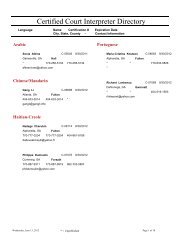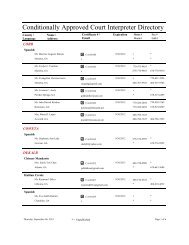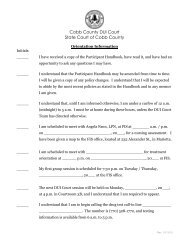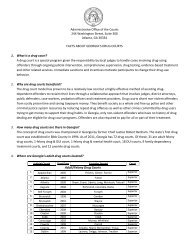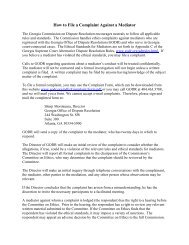2010 Drug, DUI and Mental Health Court Conference
2010 Drug, DUI and Mental Health Court Conference
2010 Drug, DUI and Mental Health Court Conference
Create successful ePaper yourself
Turn your PDF publications into a flip-book with our unique Google optimized e-Paper software.
Session Descriptions 14<br />
Wednesday, May 19, <strong>2010</strong><br />
Breakout Session 5 4:00 PM – 5:30 PM (Continued)<br />
Ensuring Sustainability: Grants <strong>and</strong> DATE Funds<br />
Judge Michael P. Boggs, Waycross Judicial Circuit; Eden Freeman, City of S<strong>and</strong>y Springs<br />
Preparing your drug court for long-term financial sustainability is a daunting task. Most drug courts, like other local<br />
government programs, operate with a combination of funds, including city <strong>and</strong> county budget appropriations, state<br />
<strong>and</strong> federal grants, reorganization of existing resources <strong>and</strong> perhaps foundation <strong>and</strong> community support. This session<br />
will explore the need to plan for long-term sustainability of your drug court program <strong>and</strong> the steps you can<br />
take.<br />
12 Step <strong>and</strong> <strong>Court</strong>s: Solutions & Spirituality<br />
Mr. Bob King, Dawson County <strong>Drug</strong> & <strong>DUI</strong> <strong>Court</strong><br />
This session will educate participants on the twelve steps <strong>and</strong> how blending court accountability, twelve step support,<br />
<strong>and</strong> spiritual growth leads to a long term recovery.<br />
How to Manage <strong>Drug</strong> <strong>Court</strong>s <strong>and</strong> Stay in Compliance Within ASFA Timelines for Children in Foster Care<br />
Judge Juanita Stedman, Cobb County Juvenile <strong>Court</strong>-Family <strong>Drug</strong> <strong>Court</strong>; Judge Patricia P. Stone, Chatham County Family<br />
Dependency Treatment <strong>Court</strong>; Judge John Worcester-Holl<strong>and</strong>, Appalachian Circuit Family Dependency Treatment <strong>Court</strong><br />
Substance abuse by a primary caregiver is the most frequent reason for children coming into foster care, especially<br />
for newborns. Substance abuse treatment requires time <strong>and</strong> commitment for the parent as well as for the system.<br />
Relapse time is often part of the recovery process. Yet, young baby brains need caring, stable adults for attachment<br />
<strong>and</strong> full capacity brain growth. ASFA (Adoption <strong>and</strong> Safe Families Act) m<strong>and</strong>ates movement toward permanency<br />
for children in foster care for 15 out of 22 months. How do all these requirements get balanced in Family<br />
Treatment <strong>Drug</strong> <strong>Court</strong>s? Carefully. Come listen to three Georgia juvenile court judges talk about what they do<br />
every day to both comply with the law <strong>and</strong> serve the children <strong>and</strong> families before them.<br />
When Sanctions <strong>and</strong> Incentives Don’t Work: Responding to Addiction-Driven Non-Compliance<br />
Mr. Terrence Walton, DC Pretrial Services Agency<br />
This presentation will uncover the theories underlying incentives <strong>and</strong> sanctions in drug courts <strong>and</strong> suggest strategies<br />
for using these powerful tools to effectively influence participant behavior. Special emphasis will be given to distinguishing<br />
between addictive behaviors <strong>and</strong> criminal behaviors, as well as suggesting when <strong>and</strong> how to respond differentially<br />
to both. Finally, this session will describe when sanctions don’t work <strong>and</strong> how sanctioning not working can<br />
sometimes actually assist in the treatment process.<br />
Essential Components of a Successful <strong>Drug</strong> Testing Program<br />
Mr. Paul L. Cary, M.S., University of Missouri <strong>Health</strong> Care in Columbia Missouri, Toxicology <strong>and</strong> <strong>Drug</strong> Monitoring Laboratory<br />
Effective drug testing in drug court is essential to the overall success of the program. This presentation is designed<br />
to provide information <strong>and</strong> strategies for building <strong>and</strong> maintaining a successful drug testing program. Collection<br />
strategies <strong>and</strong> result interpretation - two essential components of a credible testing program will be discussed. Attendees<br />
will learn the reasons for testing, how to select clients for maximum abstinence surveillance, <strong>and</strong> what<br />
specimens yield the best results. An additional focus issue will be controlling sample tampering.



